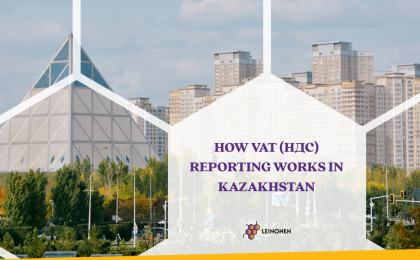Managing payroll in Kazakhstan involves navigating a complex system of taxes and contributions governed primarily by the Tax Code of the Republic of Kazakhstan. The payroll calculation process requires businesses to compute gross salaries, including wages, bonuses, and allowances, and then deduct mandatory contributions and taxes to determine net pay.
Key payroll taxes and contributions include:
- Individual Income Tax (IIT): A flat rate of 10% is withheld from employees’ gross salaries. This applies to both residents and non-residents, with deductions reported quarterly by the 15th of the second month following the reporting period (May 15, August 15, November 15, and February 15).
- Mandatory Pension Contributions (OPC): Employees contribute 10% of their gross salary to the Unified Accumulative Pension Fund (UAPF), capped at 50 times the minimum monthly wage (KZT 4,250,000 in 2025). Employers also contribute 1.5% of the employee’s salary.
- Social Contributions: Employers pay 3.5% of the employee’s salary (capped at 7 times the minimum monthly wage, KZT 595,000 in 2025) to the State Pension Centre.
- Mandatory Social Health Insurance (OMIC): Employers contribute 3% of the employee’s salary, and employees contribute 2%, both capped at 10 times the minimum monthly wage (KZT 850,000 in 2025).
- Unified Tax Payment (UTP): Introduced in 2023, this consolidates IIT, pension, social, and health insurance contributions into a single payment of 23.8% of the payroll fund for micro and small enterprises under special tax regimes, due monthly by the 25th.
Compliance and Reporting Obligations
Businesses must file quarterly payroll tax reports and maintain accurate records to comply with Kazakhstan’s labor and tax laws. Errors in calculations or filings can lead to audits, fines, or reputational damage, making compliance a significant challenge for companies without local expertise.
What’s Coming in 2026: A New Tax Code
Looking ahead to 2026, Kazakhstan’s new Tax Code promises to shake things up. While details are still taking shape, the government is trying to make life easier for businesses with a focus on streamlining processes. Expect payroll reporting to get a bit smoother, possibly with an expanded Unified Tax Payment system that could cover more companies, cutting down on paperwork. There’s talk of tweaking contribution rates, like those for social or health insurance, which might nudge up costs slightly. What is certain is that in the short term, payroll specialists will have their hands full in 2026 getting adapted to the changes.
Why to Outsource Payroll
This is where outsourcing shines. Handing payroll over to a specialized provider takes the weight off your shoulders. These experts know the ins and outs of Kazakhstan’s tax and labor laws, ensuring compliance without you breaking a sweat. They leverage tools like 1C and self-service platforms, so you’re not stuck managing spreadsheets or chasing deadlines. It’s also a cost-saver—no need to build an in-house HR team fluent in local rules. With 2026 bringing new rules, a trusted partner can help you navigate the changes seamlessly, letting you focus on growing your business instead of wrestling with payroll.
Get in touch today to organise a consultation with a Kazakhstan payroll expert and stay informed on the latest changes affecting you.





